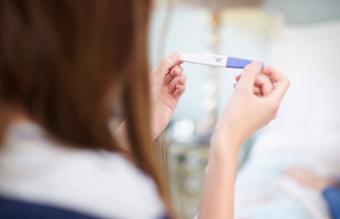
Title: Parents_and_Child.jpg Source: istockphoto.com Permission: Licensed
A number of causes of secondary infertility exist. This situation can be difficult for parents who didn't expect to have difficulties in conceiving when they wanted to expand their family.
What Is Secondary Infertility?
Secondary infertility is described as being unable to conceive after one has already given birth to at least one child.
Some Causes of Secondary Infertility
The causes of secondary infertility are similar to those of primary infertility. In about one-third of cases, the reason for the inability to conceive a second (or subsequent) time can be attributed to a low sperm count. Other reasons for secondary infertility are:
- Endometriosis
- Damaged fallopian tubes
- Ovulation problems (Lack of Ovulation/Irregular Ovulation)
- Fibroids
In just over 15 percent of cases, medical tests indicate that the cause of secondary infertility is a combination of factors shared by both partners.
Age May Be a Factor
As a woman ages, her chances of becoming pregnant in any given month decrease. This decline in fertility starts after she reaches the age of 30. After the age of 35, the likelihood of conceiving decreases more rapidly. Since some women go through menopause at an early age, this may also be a cause of secondary infertility.
Some experts in the field of human reproduction have suggested that male fertility is also affected by age and that a decline in male fertility starts after age 35.
Stress and Secondary Infertility
Stress may also be a factor affecting male fertility. According to studies conducted in Denmark, if a man already has a low sperm count, stress exacerbates this condition. If a couple is undergoing In Vitro Fertilization (IVF) treatments, which is a stressful experience, the quality of the man's sperm is lower.
Medications
Some over-the-counter medications, such as antihistamines and some antibiotics, have an effect on male fertility by lowering sperm count and changing the quality of the sperm (shape and/or mobility). If you plan to start or add to your family, do mention this fact to your pharmacist. He or she may be able to suggest a brand or type of medication that is less likely to affect your fertility.
Chronic Illness
Another one of the causes of secondary infertility is chronic illness. Both high blood pressure and diabetes can affect fertility. If a person has undergone chemotherapy or radiation treatments for cancer, the treatments can render the person infertile. Cancer patients are encouraged to have sperm samples or eggs frozen before undergoing treatment in an effort to preserve fertility.
Diet and Lifestyle
Being either underweight or overweight can affect fertility. Try to achieve a healthy body weight through a healthy diet and regular exercise. Smoking has also been found to affect fertility so you should talk to your doctor about medical help if you are unable to quit on your own. If you drink alcohol, do so in moderation.
When to Seek Treatment for Secondary Infertility
Some people assume that because they have had at least one child, they won't have trouble getting pregnant again. Statistically, over 90 percent of couples will conceive within two years of having unprotected sex on a regular basis without any medical treatment. If a couple has been trying to conceive for 12 months or longer without success, a visit to the family doctor should be scheduled.
Both the male and female partner should go to the appointment since infertility (whether primary or secondary) is an issue that affects both parties. A referral to a fertility specialist for an infertility workup may be necessary, as well.
The causes of secondary infertility are numerous. If you have concerns about your inability to conceive, consult a doctor to get advice and the appropriate treatment.
.







